
This June, Steven Spielberg made a dire prediction for the implosion of the film industry. According to him, all it would take is a half dozen or so mega-blockbusters (in the $250 million range) flopping to alter the industry forever. He painted a picture of a world where moviegoers would only pay $7 to see films like his "Lincoln", while forking over $25+ to see blockbusters like "The Avengers". Summer 2013 seemed to prove him right -- Disney's "The Lone Ranger" made a scant $89 million domestically off a $215 million budget, and that was just the first of many under-performers and under-whelmers. Thank goodness, then, that the latter half of the year proved that Hollywood isn't quite dead yet. In fact, looking back on the last twelve months as a whole from the cusp of a new year, 2013 was actually fairly strong for the world of cinema: from old legends like Woody Allen to up-and-comers like Dane DeHaan; from YA heroine Katniss Everdeen to historical figure Solomon Northup; from heart-rending indies to stunning technological marvels...there was a little bit of something for everyone this year.
Last week, my colleague Nick chose his 10 favorite films of the year. Now, it's my turn. (Note: In an effort to single out as many deserving films as possible, I left out a couple that I really enjoyed because they had already been highlighted on his list. Sorry, "Blue Is The Warmest Color" and "Inside Llewyn Davis"! You guys were great.) Without further ado, here are the films I enjoyed the most in 2013.
• All Is Lost
• Blackfish
• Enough Said
• Frozen
• Saving Mr. Banks
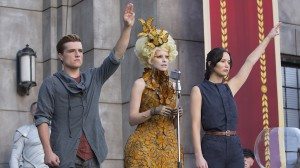 After a summer of disappointing blockbusters, you would have been forgiven for thinking that the second entry in this franchise would be just as dull and uninspired. Fortunately, "Catching Fire" proved the exception to the rule, delivering both big-budget action and compelling character studies. The first "Hunger Games" film was a solid if unremarkable adaptation of the book. "Catching Fire" surpasses it in almost every way. The effects look sharper, the camerawork is less shaky, and the acting has improved, bolstered by stellar performances from franchise newcomers Philip Seymour Hoffman, Jeffrey Wright, and Jena Malone in particular as the furious, fearless Johanna. And of course, there's America's sweetheart herself, Jennifer Lawrence. Now with an Oscar sitting on her mantle at home, she's more assured than ever, as her Girl On Fire practically burns through the screen. It's a rare blockbuster that combines exciting action with thought-provoking social critique.
After a summer of disappointing blockbusters, you would have been forgiven for thinking that the second entry in this franchise would be just as dull and uninspired. Fortunately, "Catching Fire" proved the exception to the rule, delivering both big-budget action and compelling character studies. The first "Hunger Games" film was a solid if unremarkable adaptation of the book. "Catching Fire" surpasses it in almost every way. The effects look sharper, the camerawork is less shaky, and the acting has improved, bolstered by stellar performances from franchise newcomers Philip Seymour Hoffman, Jeffrey Wright, and Jena Malone in particular as the furious, fearless Johanna. And of course, there's America's sweetheart herself, Jennifer Lawrence. Now with an Oscar sitting on her mantle at home, she's more assured than ever, as her Girl On Fire practically burns through the screen. It's a rare blockbuster that combines exciting action with thought-provoking social critique.
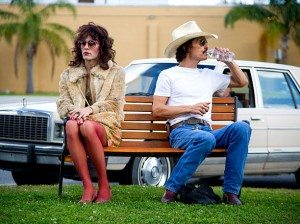 An imperfect film remarkable for the two career-best performances it contains, "Dallas" tells the true story of Ronald Woodruff, a rodeo cowboy who, in the early days of the HIV/AIDS crisis, finds out he has contracted the disease. As Woodruff, Matthew McConaughey completes his transition from rom-com beefcake to respectable, serious actor. He sheds weight -- and his dignity -- to play the chauvinistic, insecure, desperate man struggling to stay alive. Just as good is costar Jared Leto as the transgender Rayon. His is the definition of a transformative performance. Leto completely disappears into Rayon's skin; the only time he's even barely recognizable is in a heartbreaking scene where Rayon strips off her makeup and wig to pay a painful visit to her estranged father. The film itself occasionally lacks subtlety, but you'll likely be too engrossed in its defiant spirit and the powerful acting to notice. (My full review.)
An imperfect film remarkable for the two career-best performances it contains, "Dallas" tells the true story of Ronald Woodruff, a rodeo cowboy who, in the early days of the HIV/AIDS crisis, finds out he has contracted the disease. As Woodruff, Matthew McConaughey completes his transition from rom-com beefcake to respectable, serious actor. He sheds weight -- and his dignity -- to play the chauvinistic, insecure, desperate man struggling to stay alive. Just as good is costar Jared Leto as the transgender Rayon. His is the definition of a transformative performance. Leto completely disappears into Rayon's skin; the only time he's even barely recognizable is in a heartbreaking scene where Rayon strips off her makeup and wig to pay a painful visit to her estranged father. The film itself occasionally lacks subtlety, but you'll likely be too engrossed in its defiant spirit and the powerful acting to notice. (My full review.)
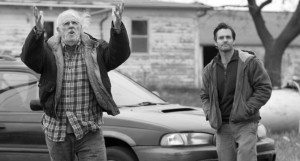 From director Alexander Payne ("The Descendants", "Sideways") comes this little gem of a film about a young man who takes his father, Woody (Bruce Dern), on a cross-country road trip. What follows is a leisurely, nostalgic film about family, history, regret, and forgiveness. With its unusual black-and-white cinematography, the film feels like it belongs to a bygone era, even though it takes place in present day -- but Woody himself is a relic, so it feels appropriate. He's a lingering figure from the past whose stubborn belief in a pile of fictional money is the only thing he has to live for. Dern, usually relegated to supporting player throughout his career, finally gets his chance to shine here. Also terrific are Will Forte as Woody's bemused son, June Squibb as Woody's foul-mouthed but stolid wife, and Stacy Keach as a malicious figure from Woody's past. It's a film so truthful and human that almost any moviegoer will undoubtedly find themselves identifying with some part of Woody's journey.
From director Alexander Payne ("The Descendants", "Sideways") comes this little gem of a film about a young man who takes his father, Woody (Bruce Dern), on a cross-country road trip. What follows is a leisurely, nostalgic film about family, history, regret, and forgiveness. With its unusual black-and-white cinematography, the film feels like it belongs to a bygone era, even though it takes place in present day -- but Woody himself is a relic, so it feels appropriate. He's a lingering figure from the past whose stubborn belief in a pile of fictional money is the only thing he has to live for. Dern, usually relegated to supporting player throughout his career, finally gets his chance to shine here. Also terrific are Will Forte as Woody's bemused son, June Squibb as Woody's foul-mouthed but stolid wife, and Stacy Keach as a malicious figure from Woody's past. It's a film so truthful and human that almost any moviegoer will undoubtedly find themselves identifying with some part of Woody's journey.
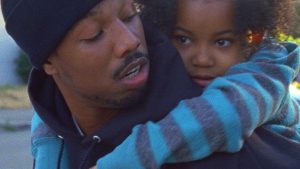 The feature debut of filmmaker Ryan Coogler, this affecting indie drama chronicles the last twenty-four hours in the life of Oscar Grant, who was killed by a police officer early in the morning of January 1, 2009. The film features a breakout performance by Michael B. Jordan as Oscar. Jordan had garnered some praise through his roles on "Friday Night Lights" and "Parenthood", as well as the sci-fi hit "Chronicle", but it is "Fruitvale Station" that has brought him to the industry's attention. Together, Coogler and Jordan admirably avoid the trap of turning Oscar into a martyr. As portrayed here, he is a man with many flaws, but he is also a man struggling to get his life back on track, mostly for the sake of his young daughter. By making the audience see Oscar as a real human being, it's all the more tragic when he's senselessly gunned down. It would be less affecting to see a perfect hero fall than this young man full of both big dreams and debilitating weakness.
The feature debut of filmmaker Ryan Coogler, this affecting indie drama chronicles the last twenty-four hours in the life of Oscar Grant, who was killed by a police officer early in the morning of January 1, 2009. The film features a breakout performance by Michael B. Jordan as Oscar. Jordan had garnered some praise through his roles on "Friday Night Lights" and "Parenthood", as well as the sci-fi hit "Chronicle", but it is "Fruitvale Station" that has brought him to the industry's attention. Together, Coogler and Jordan admirably avoid the trap of turning Oscar into a martyr. As portrayed here, he is a man with many flaws, but he is also a man struggling to get his life back on track, mostly for the sake of his young daughter. By making the audience see Oscar as a real human being, it's all the more tragic when he's senselessly gunned down. It would be less affecting to see a perfect hero fall than this young man full of both big dreams and debilitating weakness.
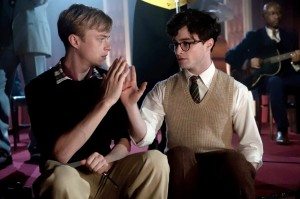 Another indie drama from a first-time director based on the life of a real person, featuring a career-making performance by a young man previously best known for the sci-fi hit "Chronicle". This time the film tells the story of Allen Ginsberg and the early days of the Beat poets, and features the captivating Dane DeHaan (Harry Osborn in "The Amazing Spider-Man 2"). Daniel Radcliffe stars as the nebbishy Ginsberg, but it's DeHaan's unbalanced and seductive Lucien Carr who steals the show. As the volatile subject of Allen's affections, DeHaan is intense, unpredictable and sensual. Using off-kilter editing, low lighting, a killer soundtrack and frenetic pacing, the film itself brilliantly evokes the improvisational rhythms of jazz. Containing a restless energy that perfectly captures the dangerous spirit of the times, "Kill Your Darlings" is an exciting exhibit for both a promising filmmaker and a star in the making. (My full review.)
Another indie drama from a first-time director based on the life of a real person, featuring a career-making performance by a young man previously best known for the sci-fi hit "Chronicle". This time the film tells the story of Allen Ginsberg and the early days of the Beat poets, and features the captivating Dane DeHaan (Harry Osborn in "The Amazing Spider-Man 2"). Daniel Radcliffe stars as the nebbishy Ginsberg, but it's DeHaan's unbalanced and seductive Lucien Carr who steals the show. As the volatile subject of Allen's affections, DeHaan is intense, unpredictable and sensual. Using off-kilter editing, low lighting, a killer soundtrack and frenetic pacing, the film itself brilliantly evokes the improvisational rhythms of jazz. Containing a restless energy that perfectly captures the dangerous spirit of the times, "Kill Your Darlings" is an exciting exhibit for both a promising filmmaker and a star in the making. (My full review.)
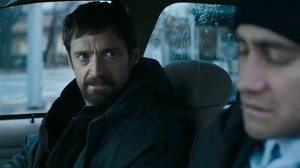 As Keller, a father desperate to find and save his missing daughter, Hugh Jackman delivers a performance of such unbridled fury it's frightening to watch, even from the comfortable distance of a dark movie theater. It's a no-holds-barred performance in a film that's equally pitiless in its intensity. Masterfully directed by Denis Villeneuve ("Incendies"), "Prisoners" utilizes a sparse score, a drab color scheme, static camerawork and a deliberate pace to imbue every single frame with a palpable sense of dread. As the film slips further and further into morally grey areas, it becomes clear that a happy ending is all but impossible. That sense of bleak inevitability makes the film a grueling experience to watch, but well worth it for all the ways in which it transcends the tired tropes of the revenge drama. Boasting a superb supporting cast including Jake Gyllenhaal, Melissa Leo, Paul Dano, Maria Bello, Terrence Howard and Viola Davis, "Prisoners" is torturous experiment in tension that's not for the faint-of-heart. (My full review.)
As Keller, a father desperate to find and save his missing daughter, Hugh Jackman delivers a performance of such unbridled fury it's frightening to watch, even from the comfortable distance of a dark movie theater. It's a no-holds-barred performance in a film that's equally pitiless in its intensity. Masterfully directed by Denis Villeneuve ("Incendies"), "Prisoners" utilizes a sparse score, a drab color scheme, static camerawork and a deliberate pace to imbue every single frame with a palpable sense of dread. As the film slips further and further into morally grey areas, it becomes clear that a happy ending is all but impossible. That sense of bleak inevitability makes the film a grueling experience to watch, but well worth it for all the ways in which it transcends the tired tropes of the revenge drama. Boasting a superb supporting cast including Jake Gyllenhaal, Melissa Leo, Paul Dano, Maria Bello, Terrence Howard and Viola Davis, "Prisoners" is torturous experiment in tension that's not for the faint-of-heart. (My full review.)
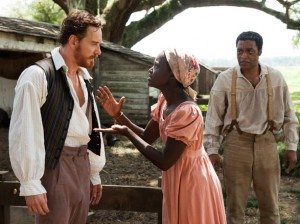 It seems oddly appropriate that it took a non-American to finally make the definitive film on American slavery. British director Steve McQueen ("Hunger", "Shame") turned an unflinching eye on the ugly history of this country and in doing so crafted one of the most honest, uncomfortable and important films of the year. It's a brilliant choice to tell the story of a free man sold into slavery, because witnessing events through his unaccustomed eyes allows us an entrance into an otherwise inaccessible experience. None of us know what it's like to be a slave -- neither did Solomon Northup, until one day he woke up and found out he had become one. As Solomon, Chiwetel Ejiofor does great work, but it's the colorful players around him who leave the biggest impression, particularly Michael Fassbender as a volatile slave owner and newcomer Lupita Nyong'o as poor, besieged Patsey. The atrocities she's forced to endure are beyond comprehension. "12 Years" isn't a film you'll want to watch again anytime soon, but it's an unapologetically authentic look at a piece of our country's history that we all want to forget -- and absolutely shouldn't.
It seems oddly appropriate that it took a non-American to finally make the definitive film on American slavery. British director Steve McQueen ("Hunger", "Shame") turned an unflinching eye on the ugly history of this country and in doing so crafted one of the most honest, uncomfortable and important films of the year. It's a brilliant choice to tell the story of a free man sold into slavery, because witnessing events through his unaccustomed eyes allows us an entrance into an otherwise inaccessible experience. None of us know what it's like to be a slave -- neither did Solomon Northup, until one day he woke up and found out he had become one. As Solomon, Chiwetel Ejiofor does great work, but it's the colorful players around him who leave the biggest impression, particularly Michael Fassbender as a volatile slave owner and newcomer Lupita Nyong'o as poor, besieged Patsey. The atrocities she's forced to endure are beyond comprehension. "12 Years" isn't a film you'll want to watch again anytime soon, but it's an unapologetically authentic look at a piece of our country's history that we all want to forget -- and absolutely shouldn't.
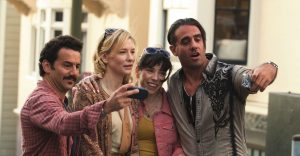 "Blue Jasmine" is Woody Allen's best film since 2005's "Match Point", and it's also his most timely. It serves as both a cautionary tale for our era of economic collapse, and as a study of what happens to a person when their self-constructed illusions are shattered. Cate Blanchett's performance as Jasmine is shockingly void of vanity. She often looks absolutely terrible: baggy eyes, unkempt hair, sweat-stained blouses. Her stubborn unwillingness to adjust to her new circumstances results in a severely fractured psyche. The film itself reflects that fractured nature, flickering back and forth between Jasmine's privileged past and her disastrous present. It's difficult to like Jasmine: she's a pathetic, unsympathetic character, more willing to blame the universe for conspiring against than to admit her own wrongdoings. But she's completely, believably human -- and it's not impossible to imagine that, under the right circumstances, she could be any one of us.
"Blue Jasmine" is Woody Allen's best film since 2005's "Match Point", and it's also his most timely. It serves as both a cautionary tale for our era of economic collapse, and as a study of what happens to a person when their self-constructed illusions are shattered. Cate Blanchett's performance as Jasmine is shockingly void of vanity. She often looks absolutely terrible: baggy eyes, unkempt hair, sweat-stained blouses. Her stubborn unwillingness to adjust to her new circumstances results in a severely fractured psyche. The film itself reflects that fractured nature, flickering back and forth between Jasmine's privileged past and her disastrous present. It's difficult to like Jasmine: she's a pathetic, unsympathetic character, more willing to blame the universe for conspiring against than to admit her own wrongdoings. But she's completely, believably human -- and it's not impossible to imagine that, under the right circumstances, she could be any one of us.
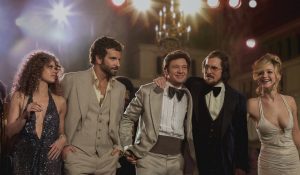 With the release of "American Hustle", it's safe to say that David O. Russell is the most exciting director of quintessentially American films since Scorsese. "Hustle", based loosely on the Abscam schemes of the 1970s, combines the casts of Russell's last two films into one unbeatable all-star cast: Christian Bale is schlubby and surprisingly sympathetic as conman Irving. Amy Adams is ferociously sexy as his partner/lover Sydney. Bradley Cooper is delightfully unhinged as an obsessive FBI agent. And Jennifer Lawrence steals the show from all of them as Rosalyn, Irving's boozy, lonely, nihilistic wife. The film is undeniably messy, but in an entirely intentional way. The scattered focus and relentless tempo are redolent of the freewheeling energy of the time in which the film takes place, and watching these well-drawn characters attempt to hustle their way (often unsuccessfully) through this chaotic mess makes for the most unpredictable fun you'll have in theaters this year. (My full review.)
With the release of "American Hustle", it's safe to say that David O. Russell is the most exciting director of quintessentially American films since Scorsese. "Hustle", based loosely on the Abscam schemes of the 1970s, combines the casts of Russell's last two films into one unbeatable all-star cast: Christian Bale is schlubby and surprisingly sympathetic as conman Irving. Amy Adams is ferociously sexy as his partner/lover Sydney. Bradley Cooper is delightfully unhinged as an obsessive FBI agent. And Jennifer Lawrence steals the show from all of them as Rosalyn, Irving's boozy, lonely, nihilistic wife. The film is undeniably messy, but in an entirely intentional way. The scattered focus and relentless tempo are redolent of the freewheeling energy of the time in which the film takes place, and watching these well-drawn characters attempt to hustle their way (often unsuccessfully) through this chaotic mess makes for the most unpredictable fun you'll have in theaters this year. (My full review.)
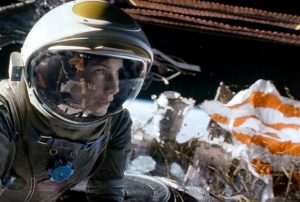 In all of 2013, no single film beguiled audiences, captured imaginations, blew minds, or advanced cinema as an art form in the way that "Gravity" did. In an age when studios and filmmakers seem content to churn out remake after sequel after reboot after prequel, few directors actually take the time to craft a truly unique piece. Director Alfonso Cuarón spent four-and-a-half years developing, researching, writing, inventing the technology for, shooting and editing "Gravity". The result was a film unlike anything anyone had seen before. Full of breathtaking camerawork, seamless effects, and How did they do that? moments, "Gravity" is as close to actually being in space as most of us will ever get. Some have accused the script of being too simplistic. It's not -- it's merely efficient. With few distractions or tangents, Dr. Ryan Stone's compelling story of grief, struggle and rebirth is played out through sparse dialogue, facial expressions and beautiful imagery. It's a tour-de-force of both writing and acting from star Sandra Bullock. The film's brief running time means that no moment is wasted, and the breakneck pace never lets up for a second. The ability to be completely submersed in a fictional world is the reason many of us go to movies in the first place, but it's also a feat that few films these days manage to accomplish. "Gravity" does so with apparent ease, belying the years of hard work and passion that went into its creation, and singlehandedly sets the bar higher for all of cinema. I already can't wait to see what Cuarón comes up with next. (My full review.)
In all of 2013, no single film beguiled audiences, captured imaginations, blew minds, or advanced cinema as an art form in the way that "Gravity" did. In an age when studios and filmmakers seem content to churn out remake after sequel after reboot after prequel, few directors actually take the time to craft a truly unique piece. Director Alfonso Cuarón spent four-and-a-half years developing, researching, writing, inventing the technology for, shooting and editing "Gravity". The result was a film unlike anything anyone had seen before. Full of breathtaking camerawork, seamless effects, and How did they do that? moments, "Gravity" is as close to actually being in space as most of us will ever get. Some have accused the script of being too simplistic. It's not -- it's merely efficient. With few distractions or tangents, Dr. Ryan Stone's compelling story of grief, struggle and rebirth is played out through sparse dialogue, facial expressions and beautiful imagery. It's a tour-de-force of both writing and acting from star Sandra Bullock. The film's brief running time means that no moment is wasted, and the breakneck pace never lets up for a second. The ability to be completely submersed in a fictional world is the reason many of us go to movies in the first place, but it's also a feat that few films these days manage to accomplish. "Gravity" does so with apparent ease, belying the years of hard work and passion that went into its creation, and singlehandedly sets the bar higher for all of cinema. I already can't wait to see what Cuarón comes up with next. (My full review.)